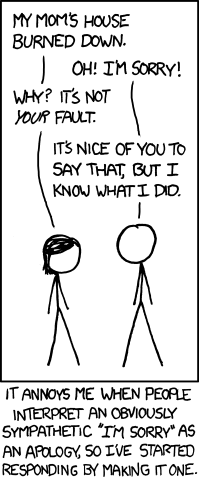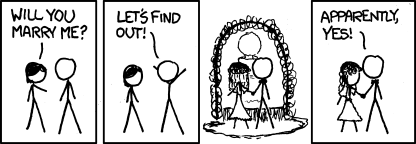I've been doing some admittedly shallow searching on topics like Grice and cooperative principle, and all I'm finding focuses on the role of the speaker. Surely there is work describing a "cooperative listener"?I think that there are several areas of research that may be relevant, including work on:
- what expectations hearers have,
- whether the Cooperative Principle is real/operative,
- charity in interpretation (perhaps the hearer-side counterpart of cooperation), and
- feedback that hearers provide to the speaker (also a candidate for being the hearer-side counterpart of cooperation).
There has been a lot of work on what expectations hearers have (and what they are justified in having). For example neo-Griceans such as Larry Horn and Stephen Levinson try to boil Grice's maxims down to two or three. According to Levinson, each of them can be expressed as a guideline for the speaker and a rule of thumb for the hearer.
e.g. Speaker side: Say as much as you can.
Hearer side: What isn't said, isn't. (Levinson 2000, p. 31)
A classic paper on hearer expectations (and speaker maxims) is Wilson and Sperber 2002, which argues that there is no maxim of truthfulness and, correspondingly, hearers do not expect speakers to say only things that are literally true:
"hearers expect to be provided with true information. But there is an infinite supply of true information which is not worth attending to. Actual expectations are of relevant information, which (because it is information) is also true. However, we have argued that there just is no expectation that the true information communicated by an utterance should be literally or conventionally expressed..." (pp. 627-8)On the Cooperative Principle more specifically, a number of theorists have argued that talk-exchanges need not be cooperative, and that the fundamental explanation for speakers tailoring their utterances to their audience is simply that they want to be understood (Kasher 1976, Sperber and Wilson 1986, inter alia; but see Grice's reply to some of these criticisms: 1989, around p. 369). If this is right then hearers can't generally expect cooperation, but they can expect that utterances will have been sufficiently tailored for them to be understandable and worth processing. Relevance theory can be seen as an attempt to spell out what this amounts to, and how it could be enough for communication to work:
The goal of inferential pragmatics is to explain how the hearer infers the speaker’s meaning on the basis of the evidence provided. The relevance-theoretic account is based on another of Grice’s central claims: that utterances automatically create expectations which guide the hearer towards the speaker’s meaning. Grice described these expectations in terms of a Co-operative Principle and maxims of Quality (truthfulness), Quantity (informativeness), Relation (relevance) and Manner (clarity) which speakers are expected to observe (Grice 1961; 1989: 368-72): the interpretation a rational hearer should choose is the one that best satisfies those expectations. Relevance theorists share Grice’s intuition that utterances raise expectations of relevance, but question several other aspects of his account, including the need for a Co-operative Principle and maxims, … The central claim of relevance theory is that the expectations of relevance raised by an utterance are precise enough, and predictable enough, to guide the hearer towards the speaker’s meaning. (Wilson and Sperber, 2004, p. 607)An interesting question is what the hearer counterpart of cooperation is. It may be charitable interpretation, as perhaps manifested in interpretations of misspeakings, such as taking someone who says 'I was feeding the penguins in the park' to have been expressing the proposition (or trying to) that she was feeding the pigeons.
There is a huge literature on the 'principle of charity' in the philosophy of language, most famously in the work of Quine and Davidson, e.g.: "Assertions startingly false on the face of them are likely to turn on hidden differences of languages." (Quine, 1960, p. 59) Note that this principle, if applied rigorously (and perhaps simplemindedly), gets the pigeon/penguin example wrong and makes a mess of irony e.g. my saying 'It's beautiful weather again' in a downpour.
Formulations of the principle of charity all seem to run into some trouble or other. Whether it is assuming the speaker is speaking the literal truth, or assuming the speaker is expressing coherent beliefs, or assuming the speaker is like the hearer in her attitudes -- all appear vulnerable to counterexamples, that is, cases where operating with one of these expectations, the hearer would fail to correctly understand the speaker. One can argue that these 'counterexamples' are just exceptions to a general rule, of course. But the failures seem rather systematic.
One way in which hearers generally are rather cooperative is in their provision of feedback to the speaker to indicate various things: that they are following (or not), that they agree (or not), that they would like to hear more (or to cut in). Herb Clark has done interesting work on this (e.g. Clark and Krych 2006). There is also work on this sort of thing, particularly the way that speakers and hearers 'negotiate' taking turns in conversation, in Conversation Analysis (e.g. Sacks et al 1992).
Clark, H. H. & Krych, M. A. (2004). Speaking while monitoring addressees for understanding. Journal of Memory and Language, 50(1), 62-81.
Grice, P. (1989). Studies in the Way of Words. Cambridge, Mass: Harvard University Press.
Kasher, A. (1976). Conversational maxims and rationality. In A. Kasher (Ed.), Language in Focus: Foundations, Methods and Systems. (pp. 197–216). Dordrecht, Holland: Reidel Publishing Company.
Levinson, S. C. (2000). Presumptive Meanings: The Theory of Generalized Conversational Implicature. Cambridge, Mass: MIT Press.
Quine, W. V. O. (1960) Word and Object. Cambridge, Mass: MIT Press.
Sacks, H., Jefferson, G. & Schlegloff, E. (1992). Lectures on Conversation. Oxford: Blackwell.
Sperber, D. & Wilson, D. (1986). Relevance: Communication and Cognition (2nd Ed. 1995). Oxford: Blackwell.
Wilson, D. & Sperber, D. (2002). Truthfulness and relevance. Mind, 111(443), 583–632.
Wilson, D. & Sperber, D. (2004). Relevance theory. In L. R. Horn & G. L. Ward (Eds.), The Handbook of Pragmatics. (pp. 607–632). Malden, Mass: Blackwell.





